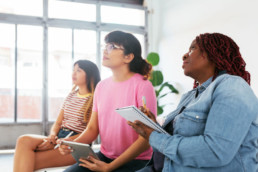Lisa Ling on the movement to stop anti-Asian violence
You’ve heard the stats: Anti-Asian hate crimes are up, more than doubling over the course of the last year. And you may have seen the disturbing videos, since so many of the violent attacks have been captured on film.
How did we get here? And how can we create a safer future for Asian Americans? This week on UNDISTRACTED, Brittany Packnett Cunningham sits down with journalist and CNN host Lisa Ling to discuss the current wave of bias and the movement that’s building to fight it.
Award-winning journalist Ling is the host and executive producer of the CNN docuseries “This is Life with Lisa Ling,” which explores stories from communities across the country.
Packnett Cunningham and Ling dig into the rising trend of anti-Asian violence, its little-taught history, the problem with the “model minority” view of Asians and how we can all take action against anti-Asian racism. Highlights include:
Ling on Trump’s role in the rise of anti-Asian hate crimes: “Do I think that Trump’s rhetoric had something to do with the increase in attacks? I mean, how could it not? Covid-19 has a bonafide name and for, arguably the leader of the free world, to not only refer to this virus as the “China virus” or the “Kung Flu” or the “Wuhan virus;” whenever he said it, he said it with such contempt, at a time when life in this country has been entirely upended, hundreds of thousands of people have become infected and died of this virus. It’s hard not to see how there could be a correlation. The contempt that he expressed whenever he talked about it—to me was inciting in and of itself.”
Ling on the harm of “model minority” myth—the idea that Asian American and Pacific Islanders are a monolithic group of “well-behaved” immigrants: “The ‘model minority’ myth, which is exactly that—it’s a myth—was used to pit minority communities against each other. Look! Asian Americans: they are hardworking. They are such achievers. Why can’t all minorities be like them? This period that we’re experiencing right now is a real reckoning. It’s a moment of inflection when we have to really look back and look at the reality that so many Asians are experiencing. We are not a monolith. We are comprised of so many different ethnicities. We come from so many rich cultures and our struggles and our triumphs have been entirely different. And until we recognize that, that stereotype or that categorization of the ‘model minority’ will continue to inflict and foment a lot of really adverse reactions with regard to the Asian community.”
Ling on how ordinary people can fight anti-Asian bias: “What I will say to people who are listening, ordinary citizens who are as disturbed as I am about what’s happening: If you see an Asian grandparent walking down the street alone, and you have a little bit of time, if you would maybe walk alongside him or her just to show some support and solidarity with that person. I think that would go a long way. Recognize that they are part of your community–they’re not outsiders. And don’t scapegoat them for something that they had absolutely nothing to do with. If you do see violence happening, speak out, stand with us, stand against racism and let’s show the world that we can do better—that we can stand up for each other irrespective of the color of our skin.”
Brittany’s book recs for further reading: “We are doomed to repeat the history we don’t know, so let’s get busy learning it,” Packnett Cunningham says on this week’s episode. To keep learning, she recommends the graphic novel American Born Chinese by Gene Luen Yang and The Making of Asian America by Erika Lee.
Listen on Apple Podcasts, Spotify, Stitcher or wherever you get your podcasts.
Congress recently introduced the Black Maternal Health Momnibus Act of 2021 to address the appalling rates of maternal mortality in the U.S. Almost 60% of maternal deaths occur in the first year after delivery—and the majority of these deaths are preventable, as Breana Lipscomb from the Center for Reproductive Rights pointed out at The Meteor Fund’s recent workshop, noting that Black, Indigenous and low-income moms are most at risk. Read highlights from the workshop and learn about ways to help in our wrap-up.
